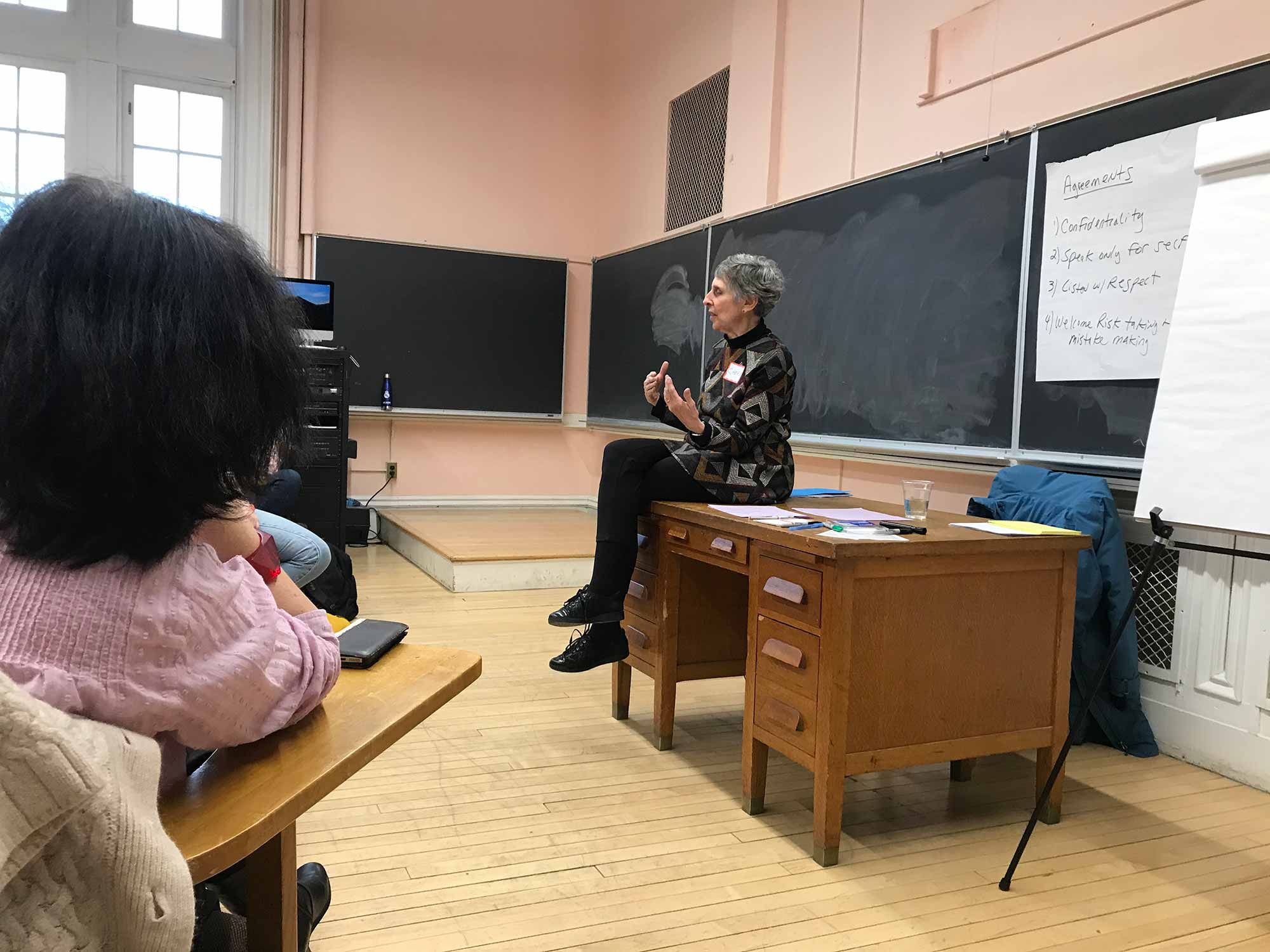Workshops Open Campus Dialogue on Anti-Semitism
Workshops Open Campus Dialogue on Anti-Semitism
After 11 people were killed in a mass shooting at the Tree of Life Synagogue in suburban Pittsburgh in 2018, students, faculty, and staff attended a candlelight vigil on the Vassar campus.
One of the organizers of the vigil, Elizabeth Aeschlimann, then-Rachlin Director for Jewish Student Life, said the murders had prompted her and others on campus to probe the rise of anti-Semitism more deeply. “After the vigil, students would talk to me from time to time about ways we could respond to this and start a dialog about anti-Semitism,” Aeschlimann said. “An idea began to surface that the college should have a workshop that delved into the issue.”

In February, an expert in examining such issues, Cherie Brown, founder and CEO of the National Coalition Building Institute, led a pair of five-hour sessions on the campus that advanced this dialogue significantly. During the workshops, more than 40 Jewish students, as well as more than a dozen non-Jewish students and staff, shared stories and observations about anti-Semitic incidents on campus—some of which have been overt and others that are more subtle.
Brown explained that anti-Semitism operates not by pushing Jews to the bottom, but by putting them in a “middle agent” role, giving them some power and privilege that positions them as the buffer between the poor and the non-Jewish ruling class. In Medieval Europe, the classic example was the Jewish tax collector; in modern times, a middle agent role might be a social worker, a doctor, or a landlord. This arrangement directs the anger of the oppressed at Jews rather than at those at the top of the hierarchy, divides groups who might otherwise be allies, and isolates Jews. “The whole picture is anti-Semitism,” said Brown.
One student who attended the workshops, Zsa Zsa Toms ’21, vice president of the Vassar Jewish Union, said she didn’t expect to learn much when she first heard about the event. “At the time, I didn’t realize what an amazing woman Cherie Brown was,” Toms said. “It was a powerful experience to be with other Jews and take part in exercises that really let us share our emotions. Hearing everyone’s stories made me feel like I wasn’t alone.”
In one exercise, participants were asked to work in pairs and to look at what they hate that anti-Semitism has done to them as Jews. After releasing this hurt, they were asked to relate what they love about being Jews.
Toms said the obvious signs of anti-Semitism sometimes startle her. But she said she and others in the workshop also talked about the less obvious kinds of prejudice, such as being asked why she can’t attend class on a major Jewish holiday or getting quizzical looks when she explains she can’t join friends for a gathering on a Friday night. “I feel invisible sometimes,” she said.
Rachel Silverman ’23 said she didn’t practice Judaism on a regular basis while growing up in Boston, “but when I came to Vassar and went to my first Shabbat during Orientation, I loved the community I found there, and I’ve gone almost every week since then.” Silverman said she’s never experienced any overt anti-Semitism on campus, “but hearing stories from others in the workshop was really impactful. I’d never been in a space in which all of us as Jews could share stories and comfort each other. It was eye-opening.”
A Jewish student of color, Tiara Coleman ’22, of Brooklyn, said she was particularly affected by a discussion in the workshop about the intersection of anti-Semitism and racism. She said she was one of very few students of color who had attended the vigil following the Tree of Life shootings. “I didn’t practice Judaism growing up, and at the time of the shootings I was exploring my Jewish identity and wanted to provide some solidarity,” Coleman said. “If anything, the workshops enhanced the work I want to do in nurturing a culture of inclusivity.”
A Muslim who attended the second workshop, Mohtad Allawala ’23, of Pakistan, said he shared Coleman’s sentiments. “I am a senator in the VSA (Vassar Student Association), and I decided I should go to the workshop to become more aware of the issues they were discussing,” Allawala said. “I don’t know many Jews or much about Jewish life on campus, and I was surprised to hear some of the stories about incidents of anti-Semitism.”
Lisa Kaul, Director of the Office of Community-Engaged Learning, said the workshops provided a much-needed platform for Jewish students to share their stories. “A lot of the bias is subtle, and students don’t often feel they have a right to make an issue out of it,” Kaul said. “These workshops gave them space to speak about them in a meaningful way.”
Aeschlimann said the workshops had accomplished all she had hoped for. “The first day, the participants were predominantly Jewish and they had a safe place to tell their stories, and the second day was a mixed group that made the experience powerful in a different way,” she said. “It’s my hope that this event deepened our understanding. I didn’t anticipate how emotional some of it would be, but I think it was cathartic for the students to share their stories. There’s more work to do, but Vassar has a commitment to address these issues, and the workshops felt like a big success.”